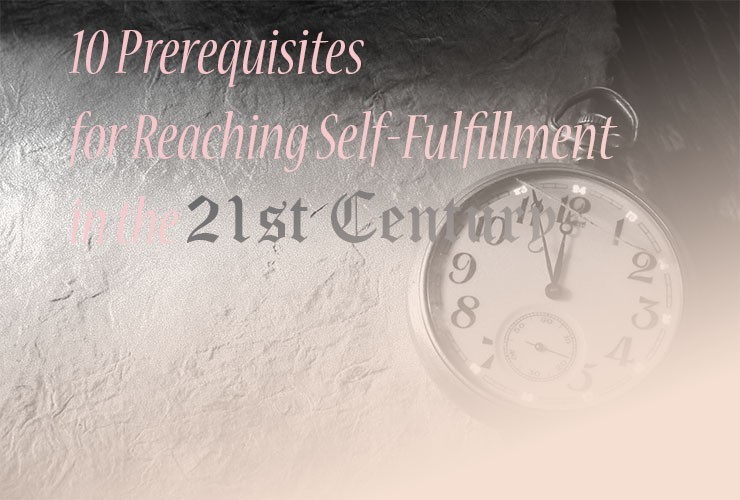Will
self-actualization be a goal for many of us in the 21st century? Whether it is a goal we intentionally set for
ourselves or whether we are simply looking to find more purpose at work, the
world of employment in the near and distant future will provide us with challenges
that we had better be prepared for. It will require us to cultivate a very wide,
macro view of our potential contribution, be it as employees, employers,
entrepreneurs, leaders or experts in the field. In this post I would like to
share some of the factors that, from the experiences of my own journey, I have
come to appreciate as pointers to self-fulfillment and success.
Though
the list below is appropriate for both men and women, I would suggest that the welcome
development we are evidencing in women's contribution to global economy is
thanks not only to increasing equality, feminist activities, and women’s strong
motivation but is also a result of a changing work environment which is
starting to recognize the need for more feminine qualities and capabilities. It
is no coincidence that women are increasingly assuming leadership and
managerial positions. It is the result of a win-win equation which allows the
best of women's attributes to meet the needs of the current economy. Although
we are still far from absolute equality in terms of senior
positions, salaries, and opportunities, I believe we are definitely on the
right track. Continuing along this path, taking responsibility for the messages
we convey to our daughters (and sons), and educating them for equal rights, opportunities,
and expectations will serve the next generations well. As further discussed in
the post The End of Feminism? Time for Parityism.
It
is not by altering who we are and adopting masculine behavior that change will
come. Nor is it by miraculously changing the eco-system of the business world
and the source of influence but rather by embracing who we are, accepting
gender differences, and realizing that the world's economy and society need a combination
of characteristics in order to triumph.
So,
here are some of the components that I believe will encourage success in the 21stcentury:
Fostering
versatility – I have long believed (even before I became a mother) that the
combination of contradictory disciplines—math and art, computers and
philosophy, physics and music, spatial reasoning and linguistic competence,
analytical thinking and emotional intelligence—gives an opportune cutting edge to
our ways of thinking and acting. It is the meeting between the imaginary world and
concrete reality that creates new outcomes; without this, results are nothing
more than repetition of the same. It is the need to be systematic, logical, and
analytic as well as creative, associative, expressional, and maybe even verbal,
that creates the uniqueness of humans over machines. In the future, robots and
computers will continue to evolve and will take over additional human
functions, but it is the soft side of our participation that will prevail, allowing
us to feel good about our self-expression and competence.
Attending to the feminine side - The right side of the brain, long considered the feminine side, is gradually becoming recognized for its added value to managerial skills. These are the qualities which distinguish us from those who act like automatons and make us unique. Modern management no longer ignores the inherent advantages of intuition and associative thinking. The ability to stimulate more comprehensive thinking by combining parameters alongside the ability to make use of emotions will find an increasingly significant foothold in management and leadership. We therefore need to exploit women’s natural characteristics and let them work more in our favor. Take, for example, women's tendency to overthink. By highlighting the positive, this sometime criticized trait can be used to explain our success at multi-tasking. Multidisciplinary thinking is also closely related to this inclination; another quality which should boost women's success.

Practicing creativity – Creativity may be something we are born with, but it is also something we can nurture and practice. Creative thinking can stimulate those very same right brain skills while also allowing for internal observation in search of our unique qualities. In To Be Creative I share my own insight on what creativity is and how it can be reflected way beyond purely artistic means. The ability to think in one's own unique voice and to take part in the creation of something (an idea, concept, outcome, or product) out of nothing will no longer be the gift of the minority but rather a kind of existential tool for those looking for a purpose and a sense of self-satisfaction.
Pursuing flexibility – The transformations of the 21st century are phenomenal; technological innovations, which influence us on the individual level, shape new norms of social interactions, consumption behavior, and even geopolitical perceptions of place and time. No doubt these changes will also impact the work environment and employment. The ability to adjust to these new challenges, and hitherto unknown obstacles is crucial, and its lack may have significant repercussions. Flexibility has a direct impact on the readiness to observe and take risks and likewise on the capacity to cope with unknown future outcomes. It will be increasing important to confront inner barriers, such as fear, self-doubt, old habits and education, and step out of our comfort zones in order to pursue growth.

Adjusting to change – So, these technological transformations which create a rapidly shifting environment not only require us to adapt and be open to new applications but also demand us to believe in our ability to change. In coping with the enormous flow of information we are exposed to daily, innovation will become a major factor, and we had better get used to what technology has to offer and learn to embrace a mindset in which we see the endless possibilities and constant flux not as obstacles but rather as welcome challenges.

Proactively
shape your future – Being able to constantly adapt to the rapid evolution
around us is not enough. We need to create and be part of those changes. In my
previous post, Creating Your Reality, I discuss how we can influence
our path and integrate it into our inherent behavior; no more reactive
responses or mission accomplishments but a constant reactiveness of listening
to our passions and pursuing them. For women, listening to our inner voice
is an inbuilt mechanism. By working toward goals that derive from our own needs
and values rather than those determined by society, we can use our intuition or
sensitivity to pursue self-designed and customized career paths. We must,
however, as further discussed below, readily embrace "action" into
our set of tools in order to realize our self-potential.
Building a long-term vision – Working under the endless forces of constant advancements and continually interacting with a moving target can make us lose track of the goal. As we concentrate on the bits and bytes of "doing," in full knowledge of the never-ending need to diversify, we may drift away from a predefined path, unless we have a long-term vision which defines the points of our compass. This long vision strategy, which also infiltrates the lower ranks of an organization, will improve the ability to identify and predict potential problems; being able to solve them, once they have arisen, will no longer suffice. Long-term vision coupled with willingness to take risks while following one of many possible options can help conceive new solutions and new propositions regardless of their short-term outcomes. By looking beyond the short-term and into the horizon, we can turn inefficacy and other obstacles to our advantage and allow them to illuminate the path which leads to that long-term vision.

Building
resilience – If you’ve read this far, you’ve probably got the picture: a
relaxed and laid-back state of mind is not where we're heading. I will leave
that for another day. On the contrary, I see the ability to cope with stress,
negative criticism, anxiety and failure as a form of mental strength which is built
on our capacity to first manage negative interactions such as rejection, shame,
and vulnerability. It is by embracing the latter as fundamentals for
psychological growth that we can build up our resilience to the harder barriers
to success in modern economy. It is important to consciously practice these
feelings. As parents, by allowing our children to practice frustration, take
chances, fail and pick themselves up again, we can better prepare them for life
and equip them to face challenges.
Practicing
confidence – In the book The Confidence Code, the
authors, Katty Kay and Claire Shipman, outline a few factors that can help
boost confidence. Confidence, at least the part that’s not in our genes, is
about turning thoughts into actions. Doing and not only thinking. That requires
us to make decisions, work hard, take substantial risk, be willing to be
different, determined, persistent, and be prepared at times for bitter failure.
"You don’t get to experience how far you can go in life—at work and
everywhere else—without pushing yourself, and, equally important, without being
pushed along by others." By stepping out of our comfort zone and working toward
goals that stem from our own values and needs, we can feel a sense of purpose, a feeling that is usually
achieved by reaching pre-defined goals.
Searching for self-actualization – The work environment is shifting, creating professions as well as workplaces that will better integrate purpose and achievements and allow self- fulfillment to be more attractive and competitive. People are starting to realize that their wellbeing is less about money and more about self-expression. A higher income may lead to a stronger sense of satisfaction but not necessarily to wellbeing. Therefore, we must be prepared and open-minded enough to cultivate those tools we believe can make a difference to our ability to face changes, interact with challenges, and offer our unique added value, while simultaneously achieving our self-actualization and finding purpose in what we do.


You can choose to comment as a guest.